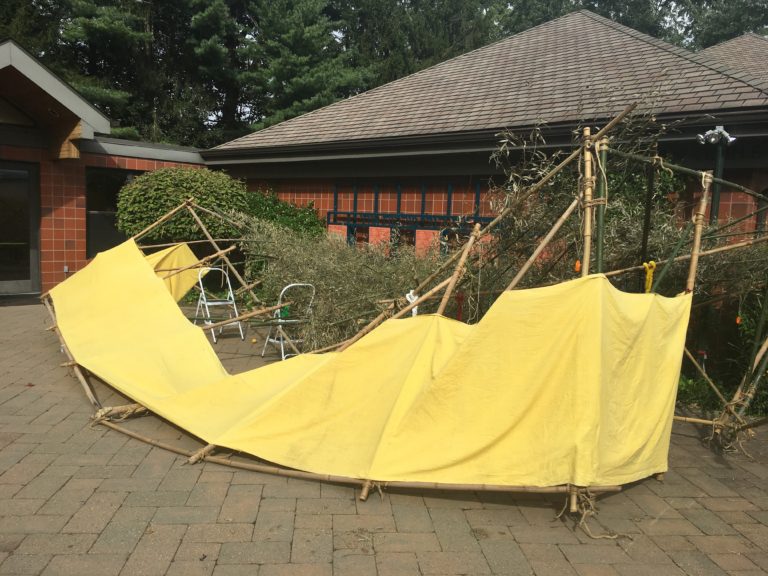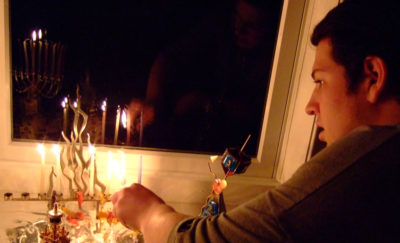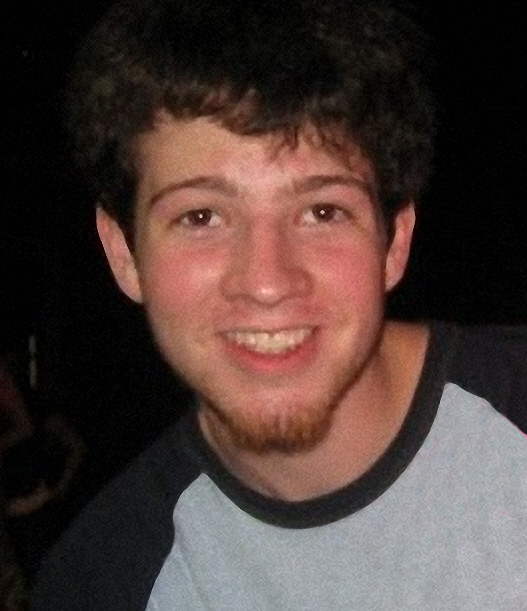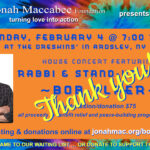Dear Jonah,
I doubt you ever attended a Yizkor service, the quarterly gathering during which we remember loved ones who have died. Nowadays, you sit there right next to me.
When I lead these services, I often share the story of someone else’s cherished memory. My hope is these stories will trigger others’ memories of their own loved ones so that their observance of Yizkor becomes a very personal tribute during the hour we spend together.
This week, for Sukkot-Simkhat Torah Yizkor, I shared a story that hit very close to home. It wasn’t about you per se, but elements of the young man’s life reminded me of you. I warned the folks gathered there that I might cry and indeed I did. Afterwards, I was asked if that was difficult for me. Difficult to remember you with tears? Not only is it not difficult for me to conjure up a good cry for you, I don’t mind doing so in public. I want people to know that I miss you, and that you’re still a very important part of my life. The only difficulty was putting away the tears so that I could continue telling the story.
The story asks one question: Is remembering what was good in the life of someone now gone worth the heartache and pain that may accompany the memories?
Here, in typically long-winded rabbinic form, is my response.
Simkhat Torah, which the Jewish community observed this week, is a time of celebration … of our good fortune to have Torah and Judaism in our lives; that is, of the opportunity to live our lives with a set of human values that have been shaped across three millennia and that help us to become good people. In my opinion, that’s worth an annual party. So during Simkhat Torah, we sing, dance and read as much Torah as we can in one hour’s time. Entire families and large swaths of our temple community come together for this holy hullabaloo, which is about as nice as temple can get.
But of course, when a family member is missing from that picture, from their familiar place in our life, things can get hard. The festival of Sukkot has something to say about that.

Our temple’s fallen sukkah
Sukkot, which immediately precedes the celebration of Simkhat Torah, reminds us that our world is beautiful, but it’s also fragile. Never was the message made clearer than at temple this year when our sukkah fell down! Blown down by the season’s heavy winds and rains, or maybe just a flaw in its construction (we harvest local bamboo and strap the pieces together to form its walls and ceiling), this year’s sukkah is a powerful reminder of what Sukkot has been trying to tell us all along: Things break.
But it was only a sukkah. We’ll build another one next year. Life, on the other hand, doesn’t always accommodate. Yes, sometimes a person will “break” – a bone, an organ, or even a spirit – and healing can restore them. But sometimes there isn’t healing. Sometimes a person breaks forever. And that’s where this year’s Yizkor story kicks in.
It’s about death (what other kind of story am I going to tell at Yizkor?). But it’s also about life (rabbis can be sneaky in that way).
Some people don’t want to ever be reminded of a loved one’s death. It just hurts too much. Some don’t even want things around that remind them their loved one even existed. I don’t fully understand this but I don’t think it’s for that person to forget; perhaps it’s to block the pain that remembering can trigger. And that’s okay – each of us chooses our own path.
For me, when it comes to you, boy, I’m all about remembering you and everything that was ever connected to you. I have no interest in setting any of you aside. I don’t live in the past, mind you; I simply carry you with me into the future. It brings a few tears, to be sure, but it’s the path I choose. I never want to stop feeling your presence, even while moving forward with my own life.
So I found this story about remembering, and it’s a hard one for me, because it shares memories that you could never create – your life ended before marriage and children. And so I can’t have those memories of you, and that makes me cry.
But it’s also okay, because, a) I like the story; and, b) I like imagining what might have become of you as regards career, community service, and love. So here’s the story. It’s based on a real family but the story could be any of ours. It might not be a child (I hope it’s not a child) but regardless, I wonder what you – whatever it is that remains of you, Jonah, in 2018 – would think of it, and whether or not you too would get a good cry from it.
Here ‘tis.*
As an only child, Hanukkah was a quiet affair growing up. She vowed that someday she would marry and would have six children, and Hanukkah would vibrate throughout her home with energy and with love. She found a person with whom to share her life and her dream, but they hadn’t reckoned on the possibility of infertility. Undaunted, they applied for adoption and, within a year, he arrived.
They called him their Hanukkah Boy because he came in December when he was just six days old. Then nature surprised them when, in rapid succession, they added two biological children to their family — not as many as they’d dreamed of but, compared with her quiet childhood, three made an entirely satisfactory crowd.
16 years old … you loved setting up and lighting Hanukkah candles
As their Hanukkah Boy grew, he made it clear that only he had the expertise to put out their Hanukkah decorations and to place the candles in their many hanukkiyot each year. He rushed into the season, starting his gift list soon after the High Holy Days. He loved Hanukkah songs, insisted on playing his Hanukkah mix a lot, and even volunteered his family each year to sing in the temple’s special Hanukkah choir that would visit nursing homes and the like. His family members’ frog-like voices, however, contrasted dramatically with his own musical gift of pretty-near perfect pitch.
Their Hanukkah Boy brought technicolor energy into their lives with his irrepressible good cheer and bossy wit, making them look and behave far better than they otherwise might have done.
Then, irony of ironies, it was during the week of his twenty-sixth Hanukkah that he left them as quickly as he had come. He was killed in a car accident on an icy Denver street, on his way home to his young wife and infant daughter. But first, he had stopped by the family home to put up Hanukkah decorations and set up the hanukkiyot, a ritual he had never abandoned.
Grief-stricken, and determined to escape the memories that clung to every room, each one withering their hearts all over again, his parents sold their home and moved to California, leaving behind friends and synagogue. In the seventeen years that followed, his wife remarried and his daughter graduated from high school.
His parents grew old enough to retire, and decided to return to Denver. They slid into the city on the tail of a blizzard, driving through streets ablaze with holiday lights. Looking away from the glow, she fixed her gaze on the distant Rocky Mountains where their son had loved to hike. Now in the foothills there was his grave—a grave she could not bear to visit.
They settled into a small, boxy house, so different from the family home where they had orchestrated their happy lives. It was quiet, empty of the frenzied energy of children growing up, now replaced by the more subdued tones of later adulthood. Their other son had married and had begun his own Hanukkah traditions in another state. Their daughter, an artist, seemed fulfilled by her own career.
One day, while staring out the rear window toward the distant snowcapped mountains, she heard a car pull up, and the impatient peal of her doorbell. Opening the door, there stood their granddaughter, in her gray-green eyes an impudent grin, and in an instance she saw the reflection of her Hanukkah Boy. In her arms, a new menorah, each candle holder the image of different musical instrument. Behind the girl came her mother, stepfather and ten-year-old half-brother. They swept past her in a flurry of laughter, laying out a platter of cheese and crackers, uncorking wine, and toasting their family’s homecoming.
“You’ll recognize the decorations,” said their former daughter-in-law. “They were his. I saved them for you.” When she murmured, in remembered pain, that they hadn’t celebrated Hanukkah for seventeen years, their cheeky granddaughter said, “Then it’s time to shape up!” And only a short while later, while shoving one another out the front door, they issued an invitation to join them the next evening Shabbat Hanukkah at temple and Saturday night Hanukkah in their home. “Oh,” she stammered, “we just can’t.”
“You sure as heck can,” ordered their granddaughter, as bossy as her father had been. “I’m singing a solo, and I want to see you there!”
They had long ago given up Shabbat services but now, under pressure, they sat rigid in the front row, fighting back the tears. Then it was solo time. Their granddaughter’s magnificent soprano voice soared, clear and true, in perfect pitch. She sang the verses to “Light One Candle,” which brought back bittersweet memories of their boy. How the girl’s father would have relished this moment!
They’d been warned that, the next night, there would be “a whole mess of people” for dinner — but thirty-five! Assorted relatives and former relatives filled every corner of the house. Small children, noisy and exuberant, seemed to bounce off the walls. They could not sort out who belonged to whom, but it didn’t matter — they understood: they all belonged to one another.
They’d been utterly and completely enfolded in joyous camaraderie and love. They sang more Hanukkah songs in loud, off-key voices, saved only by their granddaughter’s amazing soprano.
Sometime after dinner, before winter sunset, it occurred to her that a true family is not always one’s own flesh and blood — it is a climate of the heart. And had it not been for their Hanukkah Boy and his chip-off-the-old-block daughter, they would not now be surrounded by caring strangers who would help them hear the music again.
Later, their granddaughter asked them to come along with her. “I’ll drive,” she proclaimed. “There’s a place I like to go.” She jumped behind the wheel of the car and, with the confidence of a newly-licensed driver, zoomed off toward the foothills.
Alongside his headstone rested a small, heart-shaped rock, slightly cracked, painted by their artist daughter. On its weathered surface were the words, “To my brother, always remembered with love.” Beneath the headstone lay a bouquet of flowers and a dreidl, sent by their number-two son, as they learned he had done every Hanukkah.
As they stood by that headstone in the chilly but somehow comforting silence, they were not prepared for their unpredictable granddaughter’s next move. Once more, her voice, so very much like her father’s, lifted up in song. And the mountainside echoed the chorus of her melody, on and on into infinity.
When the last pure note had faded, the Hanukkah Boy’s mother felt, for the first time since his death, a sense of peace. Her heart was full … of the positive continuity of life, of renewed faith and hope, and, of course, with love.
Sukkot reminds us that we live in such a fragile world. The sukkah is meant to be shaky. That, after all, is how life often proceeds.
For many of us, though, we need no such reminder. We’ve experienced life’s shakiness, even its fallen, broken moments, firsthand.
But Simkhat Torah wraps up our week of Sukkot with singing and dancing, urging us not to turn away from our grief but to hitch it right up on our shoulders and to carry it along with us into all the good that is surely yet to come.
Early 20th century physician and social reformer Havelock Ellis wrote, “All the art of living lies in a fine mingling of letting go and holding on.” Perhaps this is our Sukkot-Simkhat Torah Yizkor message.
Alongside the tears, may the memories of all our loved ones bring us to a place of sincere gratitude for their having once been with us, and to new heights of joy and happiness as we learn to carry on, despite our losses, with understanding, grace and love.
You taught me these important lessons, Jonah. You once said you might like to become a teacher. I think that’s precisely what you’ve done.
Love you forever,
Dad
* adapted from the writing of Shirley Barksdale








2 comments
Join the conversationRachel Posner - October 4, 2018
This is incredibly beautiful. Thank you for sharing it.
Carol Neiger - October 3, 2018
Billy, this is so lovely! And yes, my tears are now keeping me from writing more. Please keep sharing your stories and let me know if you allow reposting on FB.